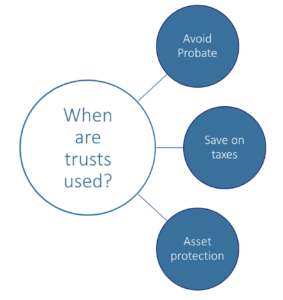Leaving a Legacy While Saving on Taxes Through Charitable Gifting
Leaving a legacy to charity is a great way to support your community, make an impact, and save on taxes. There are many charitable estate planning strategies to consider and each one comes with a careful consideration. Who you’re donating to, your financial goals, the type of asset you’re donating, tax objectives, and amount of control are just a few of the many considerations every charitable estate plan must contemplate. Using the following strategies, you can design and implement a comprehensive plan.
First, Don’t Do This…
Do not name a charity as the beneficiary of a retirement or bank account. Simply do not do this! Since big banks and financial institutions can only generate revenue based on the assets under their management, they don’t always have your best interest in mind if they lose that revenue in bequeathing your estate to your selected charity. Leaving your wealth to a stranger at a mega-corporation can cause delay and there’s no guarantee your wishes are met. Instead, it’s best to have a trusted estate “quarterback,” a.k.a. an executor and/or trustee who will ensure your plan is properly administrated. You can name your children, sibling, attorney, or trusted friend. Pick someone you trust as opposed to letting the bank pick a stranger.
Donating Through Your Will
A last will and testament is one method of donating to charities; however, it is the least efficient and most time-consuming. This option is better than naming a charity as a beneficiary of a retirement account, however, because here you at least have an executor overseeing and administering the estate. You can specify certain dollar amounts (e.g., $10,000 to XYZ church) or percentages (e.g., 10% to XYZ Church), within your will and both methods would allow your charitable beneficiaries to receive their bequest. Keep in mind that your last will does not avoid probate. Moreover, any debts against the estate would be paid first through the probate process, reducing the amount of the bequest. Nonetheless, this method is effective and acceptable.
Basic Charitable Trust Planning
Whether you already have a family trust or want to amend your current one, leaving a bequest to charity through your trust is a great way to leave a legacy. The trust will avoid probate and also provide more control. Unlike a last will, here you can spread out payments to your charity, leaving a legacy for years to come. For example, you might leave $10,000 to the OSU scholarship foundation, every year, in your family name, until the funds are depleted. Moreover, since a trust would avoid probate, the assets are also protected from creditors and the estate would remain private. Finally, you once again have a “quarterback,” known as a trustee to oversee and administer the estate.
Charitable Remainder Trust
Being able to observe the organizations you’re helping is a major benefit of an irrevocable charitable remainder trust, or “CRT.” Additionally, unlike the strategies we have discussed thus far, CRTs allow you to attain an immediate tax deduction while also creating a cash flow. The trust can be funded by real property, stock, cash, or any other type of asset. However, the tax deduction and cash flow you receive will vary depending on what type of asset you’re contributing. After funding, you receive payments over time from the revenue generated from the trust. For example, your CRT might be funded by rental properties that you not only received a tax deduction for, but now you’re receiving payments from for the rest of your life. After death, the remaining assets are given outright to the charities you’ve named.
Who’s a good fit? The CRT is a good option if you want an immediate charitable deduction but also have a need for an income stream for yourself or another person. If you set instructions to establish a CRT at your death, it is also a good option to provide for heirs, with the remainder going to charities of your choosing.
Charitable Lead Trust
A charitable lead trust, or “CLT” is the inverse of a CRT. It’s an irrevocable trust that generates a potential income stream for the named charitable beneficiary, with the remaining assets eventually going to family members or other beneficiaries. Donors choose the term of the trust and the amount distributed, at least annually, to charity. The assets used to fund a charitable trust are removed from your gross estate and may not only reduce the amount of tax your estate has to pay upon your death, but may also preserve funds for your heirs. Charitable lead trusts are not tax-exempt, and you will need to decide the tax treatment of the trust when it is created.
Who’s a good fit? This is ideal if you want to pass appreciated property to heirs and reduce gift and estate tax consequences and are also comfortable with parting with the income for a number of years in return for estate and gift tax savings.
Where Do You Start?
No matter the size of your estate, developing a charitable estate plan that will be carried out according to your wishes requires three things: (1) a Certified Public Accountant (CPA) who has experience with tax and gifting; (2) a Financial Planner; and, of course (3) an Estate Planning Attorney. The combination of utilizing these three professionals could mean the difference between a significant tax break or your estate ending up in court. For more information or to schedule a free consultation, contact Baron Law at 216-573-3723.











